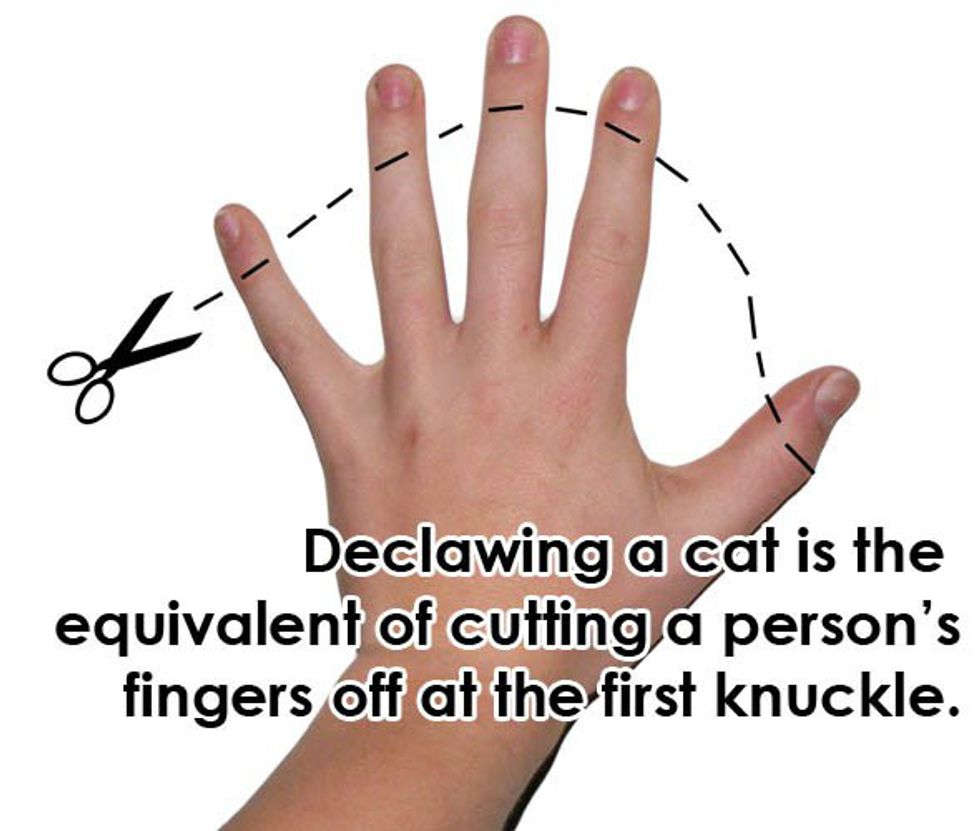Unfortunately for cats, many people think that declawing is similar to a trip to the nail salon. You go in, get your nails trimmed, they put on a pretty color, you sit and wait for them to dry and you're out of there. Quick and painless, right? Wrong, so very wrong.
Just like the salon, right? Unfortunately, for cats, declawing means the removal of the first bone for each toe in their paw.
This would be equivalent to having your fingers amputated at the first knuckle of your finger. This procedure can be incredibly painful for cats. Even though the cat is unconscious during the procedure, the pain doesn't stop there. Poor Mr. Whiskers will feel pain even after coming out of his little kitty coma. Even if your veterinarian blocked the neurons at the end of your cat's toes, the blocks will eventually wear off and the pain will set in.
If done incorrectly, sometimes the nail will begin to grow back improperly inside of the cat's paw.
This causes even greater pain for your furry friend. Up to a third of declawed cats suffer from post surgical complications. These complications can range from lameness, arthritis, nail regrowth/deformity and abscesses. An abscess is a mass full of pus and debris that are painful to touch. Not only can declawing physically affect your cat, but it can affect their personality as well.
Cats that are declawed can become more aggressive.
Because they don't have their nails to use as an emotional outlet, they will often start biting more. Nails are also your cat's first line of defense. When they feel threatened, they will turn to biting. This can lead to issues with younger kids entering a household or with friends coming over to visit.
Declawed cats have to learn how to walk again.
Just like a human, toes are important for balance. Since declawing removes part of the toe, cats suffer from impaired balance and have to relearn how to walk, similar to how a human would if they were to lose their toes.
A lot of countries have already outlawed declawing.
Declawing a cat is actually almost exclusively an American practice. Many countries call the act of declawing "inhumane," and as a result have banned it. Other countries see it as senseless mutilation, but Americans see it as convenience. Unfortunately, a lot of Americans do not realize what declawing actually does to a cat.
There are other ways to curb scratching behavior.
If your cat really enjoys to scratch, teach it what it may and may not scratch. Fill up a water gun with water and squirt your kitty when they begin to scratch on something you don't want them to. Cats may not like water, but this alternative is much better than a declawing. Also, be sure to use a firm voice and tell your cat,"No." Cats don't like loud noises, so a shaker could also prove to be useful in these instances. Shaker cans have the potential to create more timid cats, though, so use this method sparingly.
Buy scratching posts! If your cat does not quite understand the idea of a scratching post or is not interested in them, you can always spark their interest by rubbing some catnip on the post. Try rubbing catnip on things your cat is allowed to scratch and purchase a deterrent spray for the items they are not allowed to scratch. You can obtain deterrent sprays at any pet store.
Make sure to trim your cat's nails regularly! By removing the sharp tip of your cat's nail, you lessen the potential danger they pose to your furniture. Try to keep the nails rounded.
Don't declaw.
Be patient and train your cat, spare them the pain. Nails are good for defense, exercise, and stretching. All of these promote a happier, healthier cat!






















